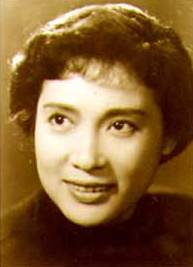Related Research Articles

Gong Li is a Chinese actress. Regarded as one of the best actresses in China today, she is known for her versatility and naturalistic performance. She starred in three of the four Chinese-language films that have been nominated for the Academy Award for Best International Feature Film.

Shen Congwen, formerly romanized as Shen Ts'ung-wen, was a Chinese writer who is considered one of the greatest modern Chinese writers, on par with Lu Xun. Regional culture and identity plays a much bigger role in his writing than that of other major early modern Chinese writers. He was known for combining the vernacular style with classical Chinese writing techniques. Shen is the most important of the "native soil" writers in modern Chinese literature. Shen Congwen published many excellent compositions in his life, the most famous of which is the novella Border Town. This story is about the old ferryman and his granddaughter Cuicui's love story. Shen Congwen and his wife Zhang Zhaohe were married in 1933, Shen Congwen and Zhang Zhaohe had two sons and one daughter after their marriage.
Huang Yu-chun, known by her final stage name Ivy Ling Po, is a retired Hong Kong actress and Chinese opera singer. She is best known for a number of mega-hit Huangmei opera films in the 1960s, especially The Love Eterne (1963) which made her an Asian superstar overnight. She played an important role in the entertainment industry for preserving the Huangmei opera art form.

Fan Bingbing is a Chinese actress. From 2013 to 2017, she was included as the highest-paid celebrity in the Forbes China Celebrity 100 list after ranking in the top 10 every year since 2006. She appeared on Time magazine's list of the 100 most influential people in 2017.

Kelly Lin or Lin Hsi-Lei is a Taiwanese actress and model who has appeared mainly in Hong Kong films.

Bae Doo-na, anglicized as Doona Bae, is a South Korean actress and photographer. She became known outside Korea for her roles as a political activist in Park Chan-wook's Sympathy for Mr. Vengeance (2002), archer Park Nam-joo in Bong Joon-ho's The Host (2006), and as the doll in Hirokazu Kore-eda's Air Doll (2009). She has had English-speaking roles in the Wachowski films Cloud Atlas (2012) and Jupiter Ascending (2015), as well as their Netflix television series Sense8 (2015–2018). In Korean-speaking roles, she is well known as the leading female character in the crime thriller Stranger (2017–2020), the Netflix period zombie thriller, Kingdom (2019–2020), and the sci-fi limited series The Silent Sea (2021).

Yu Nan is a Chinese actress. Born in Dalian, Yu Nan studied at the Beijing Film Academy, where she graduated in 1999.
Siqin Gaowa, born Duan Anlin, is a Chinese-born Swiss actress. She was born in Guangzhou to a Han Chinese father and a Mongol Chinese mother. Her father died when she was 4, she was raised by her mother in Inner Mongolia. She has been married to musician Chen Liangsheng (陈亮声) since 1986 and currently holds Swiss citizenship together with her husband.

A Mongolian Tale is a 1995 Chinese film directed by Xie Fei and adapted by the novelist and ethnographer Zhang Chengzhi from his novel, Black Steed.

A Girl from Hunan is a 1986 Chinese drama film directed by Xie Fei and U Lan. The film was screened in the Un Certain Regard section at the 1987 Cannes Film Festival, and was one of the first mainland Chinese films to be commercially screened in the United States. The film is based on a 1929 short-story, Xiao Xiao, by author Shen Congwen.
Naren is a given name in various cultures.

My Father and I is a 2003 Mainland Chinese drama directed by actress Xu Jinglei in her directorial debut. The film centers around a young girl, played by Xu, and her father, played by Ye Daying, following the death of her mother in an accident. It was critically well-received, winning the Best Directorial Debut Award for Xu Jinglei at the 2003 Golden Rooster Awards. Internationally, it screened at the 2003 Toronto International Film Festival.

Qin Yi was a Chinese actress. She gained fame for her stage performances in the war-time capital Chongqing during the Second Sino-Japanese War. After the war, she became one of China's most popular film actresses throughout the 1950s and the 1960s, and was recognised as one of the country's top four actresses. Premier Zhou Enlai called her the "most beautiful woman in China".
Rickshaw Boy is a 1982 Chinese movie directed by Ling Zifeng, based upon the novel of the same name by Lao She. The film stars Siqin Gaowa, who won a Golden Rooster for her performance, and Zhang Fengyi.
Lǚ Lìpíng is a Chinese actress.
Yang Zishan is a Chinese actress. She is known for her breakout role in the film So Young, which won her the Huabiao Award for Outstanding New Actress and the Best Actress awards at the 5th China Image Film Festival and the 5th International Chinese Film Festival. Her outstanding performance in So Young also earned her nominations for best actress for the Golden Rooster Award, the Hundred Flowers Award, and at the Asia-Pacific Film Festival. In 2015, she won the Best Actress Award at the Shanghai International Film Festival for her performance in 20 Once Again. In 2017, She starred in Walking Past the Future, the only Chinese film to be nominated for the Un Certain Regard at the 2017 Cannes Film Festival, and the science fiction thriller Battle of Memories. In 2018, she starred in Till the End of the World, the first film in history to shoot in Antarctica. In 2020, her film Wuhai premiered at the 68th San Sebastian Film Festival where it competed for the Golden Shell. In 2021, her film Ripples of Life premiered at the 2021 Cannes Film Festival. In 2023, Yang Zishan was appointed the Jury Member of the 25th Shanghai International Film Festival Golden Goblet Award. In 2024, Yang Zishan was appointed the International Jury Member to the 14th Beijing International Film Festival.
Badema is a Chinese actress and singer of Mongolian ethnicity best known for her role in Norjmaa, which earned her a Best Actress Award in the 30th Golden Rooster Awards.

Yong Mei is a Chinese actress. In 2019, she won the Silver Bear for Best Actress at the 69th Berlin International Film Festival for her performance in the film So Long, My Son directed by Wang Xiaoshuai.
Heavenly Grassland is a 2002 Chinese movie directed by Sai Fu and Mai Lisi starring Naren Hua, Ning Cai, and Tumen.
My Mongolian Mother is a 2010 Chinese movie directed by Cai Ning and starring Naren Hua. Naren Hua won the Best Actress Award at the 28th Golden Rooster Awards for her performance in the movie.
References
- ↑ China Tripping: Encountering the Everyday in the People's Republic. Rowman & Littlefield. 8 February 2019. p. 116. ISBN 978-1-5381-2371-3.
Naren Hua
- ↑ "大陆明星著名演员娜仁花" [Mainland star, famous actress Naren Hua]. 中国蒙古学信息网 (China Mongolian Studies Information Network). Inner Mongolia University Library, Mongolian Studies Division. April 2005. Retrieved 10 May 2019.
- ↑ "Best Actor and Actress". Beijing Review. 28 October 2011.
This year's Golden Rooster prizes for best actress and actor were awarded respectively to Na Renhua and Sun Chun
- ↑ "14th Huabiao awards held in Beijing". China.org.cn. 29 August 2011.
Na Renhua, for her leading role in "Mother," and Xu Fan, who stars in "Aftershock," shared the Best Actress Award
- ↑ "Na Ren-Hua". Hong Kong Movie DataBase. Retrieved 2019-04-01.
- ↑ Jeremy A. Murray; Paul G. Pickowicz; Perry Link (2019). China Tripping Encountering the Everyday in the People's Republic. Rowman & Littlefield Publishers. p. 116. ISBN 978-1-5381-2371-3.
- ↑ "《额吉》内蒙古热拍 蒙古演员娜仁花扮演草原妈妈". 1905.com (in Chinese). 10 May 2009. Retrieved 4 August 2015.
- ↑ "Festival de Cannes: A Girl from Hunan". festival-cannes.com. Retrieved 23 July 2009.
- ↑ Canby, Vincent (1988-03-04). "Film: 'Girl from Hunan' - Review". The New York Times . Retrieved 2010-01-16.
- ↑ Duzan, Brigitte (4 October 2010). "" Xiaoxiao " (《萧萧》) La nouvelle de Shen Congwen (沈从文) et son adaptation par Xie Fei (谢飞)" (in French). Retrieved 9 January 2014.
- 1 2 Maslin, Janet (1997-04-03). "A Mongolian Tale (1995): Elemental Tale in an Even More Elemental Setting". The New York Times . Retrieved 2009-05-24.
- ↑ Stack, Peter (1997-04-25). "Life May Be Simple, But Love Is Tough". San Francisco Chronicle . Retrieved 2009-05-25.
- ↑ "19th Montreal World Film Festival Awards". Film Scouts LLC. Archived from the original on 2011-07-11. Retrieved 2009-05-25.
- 1 2 3 Halligan, Fionnuala. "'A Dog Barking At The Moon': Hong Kong Review". Screen Daily. Archived from the original on 9 April 2021. Retrieved 9 April 2021.
- 1 2 Elley, Dereck. "Heavenly Grassland". Variety. Archived from the original on 8 April 2021. Retrieved 9 April 2021.
- ↑ Chun-Yen Chang; Charles Tijus; Teen-Hang Meen (2020). Education And Awareness Of Sustainability - Proceedings Of The 3rd Eurasian Conference On Educational Innovation 2020 (Ecei 2020). World Scientific Publishing Company. pp. 65–68. ISBN 978-981-12-2801-8.
- ↑ "My Mongolian Mother 2010". letterboxd.com. Retrieved 9 April 2021.
- ↑ Johnston, Sheila. "Result of 28th Golden Rooster Awards". ent.sina.com.cn. Archived from the original on 8 July 2012. Retrieved 9 April 2021.
- ↑ Tsui, Clarence. "'Walking Past the Future' ('Lu Guo Wei Lai'): Film Review | Cannes 2017". The Hollywood Reporter. Archived from the original on 9 April 2021. Retrieved 9 April 2021.
- ↑ "Billie And Emma wins audience award at Inside Out 2019". Now , June 3, 2019.
- ↑ Yartey, Abigail. "A Flare for sexual freedom and diversity". Morning Star. Archived from the original on 9 April 2021. Retrieved 9 April 2021.